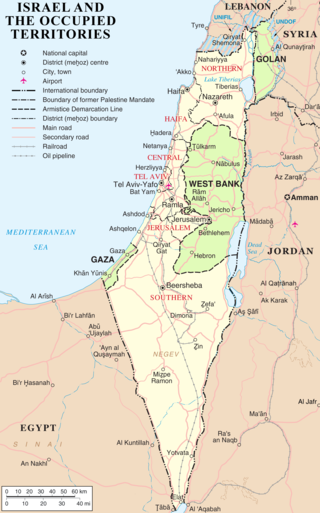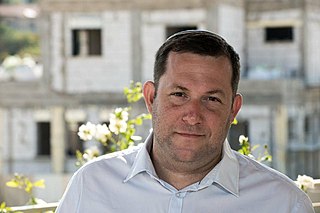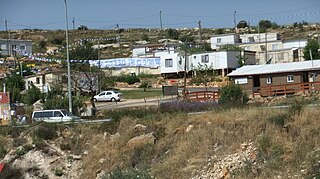
Israeli settlements, also called Israeli colonies, are the civilian communities built by Israel throughout the Israeli-occupied territories. They are populated by Israeli citizens, almost exclusively of Jewish identity or ethnicity, and were first established after Israel's victory in the Six-Day War of June 1967. The international community considers Israeli settlements to be illegal under international law, but Israel disputes this.
The so-called Elon Peace Plan is a plan to resolve the Israeli–Palestinian conflict through the principles of rehabilitation of Palestinian refugees, Israeli sovereignty over the occupied Palestinian territories, and strategic cooperation with Jordan, based on Jordan becoming a Palestinian state.
The Judea and Samaria Area is an administrative division of Israel. It encompasses the entire West Bank, which has been occupied by Israel since 1967, but excludes East Jerusalem. Its area is split into 165 Palestinian "islands" that are under total or partial civil administration by the Palestinian National Authority (PNA), and a contiguous area containing 230 Israeli settlements into which Israeli law is "pipelined".

Ariel is an Israeli settlement organized as a city council in the central West Bank, part of the Israeli-occupied territories, approximately 20 kilometres (12 mi) east of the Green Line and 34 kilometres (21 mi) west of the Jordan border. Ariel was first established in 1978 and its population was 19,647 in 2021, composed of veteran and young Israelis, English-speaking immigrants, and immigrants from the former Soviet Union, with an additional influx of above 10,000 students from Ariel University. It is the fourth largest Israeli settlement in the West Bank, after Modi'in Illit, Beitar Illit, and Ma'ale Adumim.
Yesha is a Hebrew acronym for "Judea, Samaria, Gaza" – a geographical area, roughly corresponding to the West Bank and Gaza Strip combined. Yesha is one of a number of terms used to describe the areas of former Mandatory Palestine, occupied by Egypt and Jordan and later became a part of a military governorate.

There are six main administrative districts of Israel, known in Hebrew as mekhozot and Arabic as mintaqah and fifteen sub-districts known as nafot. Each sub-district is further divided into natural regions, which in turn are further divided into council-level divisions: whether they might be cities, municipalities, or regional councils.

Israel has occupied the Palestinian territories and the Golan Heights since the Six-Day War of 1967. It previously occupied the Sinai Peninsula and southern Lebanon as well. Prior to Israel's victory in the Six-Day War, occupation of the Palestinian territories was split between Egypt and Jordan, with the former having occupied the Gaza Strip and the latter having annexed the West Bank; the Sinai Peninsula and the Golan Heights were under the sovereignty of Egypt and Syria, respectively. The first conjoined usage of the terms "occupied" and "territories" with regard to Israel was in United Nations Security Council Resolution 242, which was drafted in the aftermath of the Six-Day War and called for: "the establishment of a just and lasting peace in the Middle East" to be achieved by "the application of both the following principles: ... Withdrawal of Israeli armed forces from territories occupied in the recent conflict ... Termination of all claims or states of belligerency and respect for and acknowledgment of the sovereignty, territorial integrity and political independence of every State in the area and their right to live in peace within secure and recognized boundaries free from threats or acts of force."
The status of territories captured by Israel is the status of the Gaza Strip, the West Bank, the Golan Heights, and the Sinai Peninsula, all of which were captured by Israel during the 1967 Six-Day War.

Ariel University, previously a public college known as the Ariel University Center of Samaria, is an Israeli university located in the urban Israeli settlement of Ariel in the West Bank.
The Council for Higher Education in Israel is a supervisory body for universities and colleges in Israel. It is the only organization with the authority to award academic educational accreditation. The head of the council is always the minister of education, and at least two-thirds of its members are academics.
Dr Yechiel (Michael) Leiter is an Israeli historian of philosophy, and also a public policy analyst. Leiter is a resident scholar at Jerusalem's Herzl Institute. He has previously served as Chief of Staff to Benjamin Netanyahu at Israel's Ministry of Finance and as political assistant to Ariel Sharon in Israel's parliament. Leiter is also an ordained Rabbi and has written three books and numerous essays on politics in the Middle East.

Yossi Dagan is an Israeli activist and politician who has been the head of the Shomron Regional Council since August 2015.

Ron Nachman was an Israeli politician and former Knesset member for the Likud. The founder of Ariel, one of the largest Israeli settlements in the West Bank, he was its mayor from 1985 until his death in 2013.

Yigal Cohen-Orgad was an Israeli politician who served as Minister of Finance from October 1983 until September 1984. He was one of the founders of Ariel University, serving as its chancellor until his death.

The Levy Report, officially called Report on the Legal Status of Building in Judea and Samaria, is an 89-page report on West Bank settlements published on 9 July 2012, authored by a three-member committee headed by former Israeli Supreme Court justice Edmund Levy. The committee, dubbed the "outpost committee", was appointed by Israel's prime minister Benjamin Netanyahu in late January 2012 to investigate the legal status of unauthorized West Bank Jewish settlements, but also examined whether the Israeli presence in the West Bank is to be considered an occupation or not.
Politics in Israel are dominated by Zionist parties. They traditionally fall into three camps, the first two being the largest: Labor Zionism, revisionist Zionism, and religious Zionism. There are also several non-Zionist Orthodox religious parties and non-Zionist secular left-wing groups, as well as non-Zionist and anti-Zionist Israeli Arab parties.
The Judea and Samaria Settlement Regulation Law, commonly known as the Regulation Law or sometimes the Regularization Law, is an Israeli law that aims to retroactively legalize Israeli settlements in the West Bank Area C under the Oslo Accords. It is meant to "regulate" the status of about 2,000 to 4,000 residences in 16 settlements which were built on Palestinian-owned lands. The Knesset passed the legislation 60 to 52, on February 6, 2017. According to the law, the land on which the residences are built will remain that of the legal owners, but their usage will be expropriated by the State. In exchange, the Palestinian owners will be compensated at a rate of 125%, or receive alternate lands. The law is known by some of its critics as the "Expropriation Law" due to its land expropriation components. The Israeli occupation of the West Bank is considered a breach of international law, though Israel disputes this.

Israeli law is enforced in Israeli settlements and among Israeli civilians in Area C of the West Bank, a Palestinian territory under military occupation and therefore otherwise subject to military law. Some provisions are applied on a personal basis, such that it applies to Israeli residents rather than territory. Application of the laws has created "enclaves" of Israeli law in the Israeli-occupied West Bank, and the terms "enclave law" and "enclave-based justice" describe the resulting legal system.
Erling Ozer Schild, a Danish-born Israeli academic, was president of the University of Haifa and president of the College of Judea and Samaria, known as "Ariel College".









